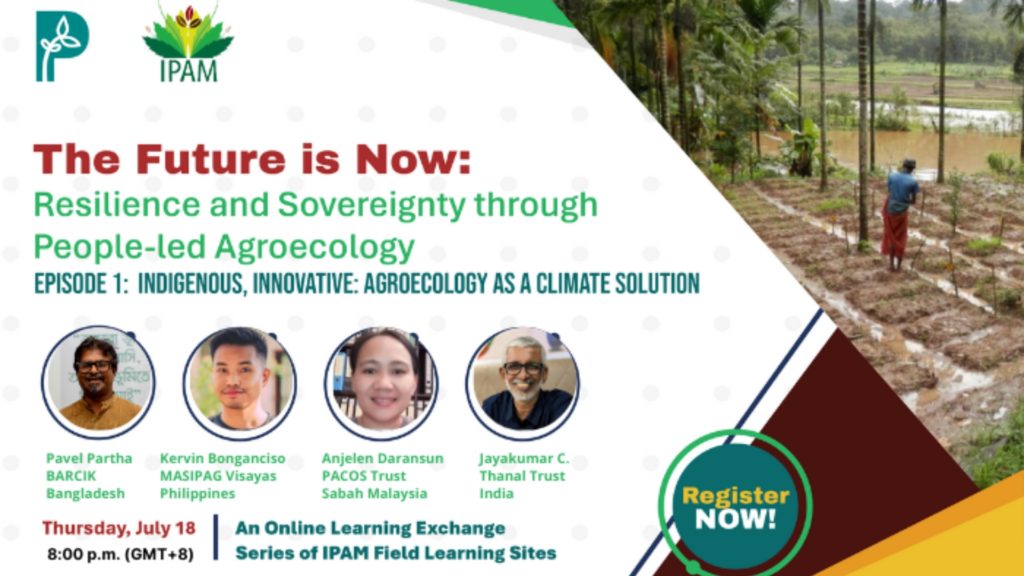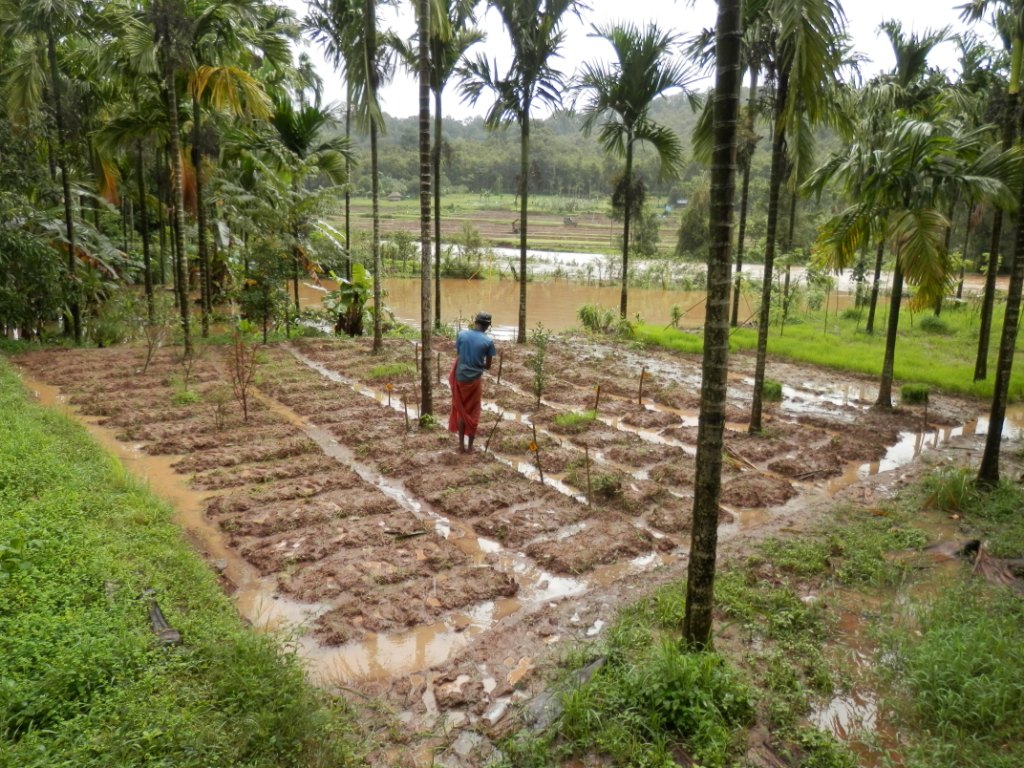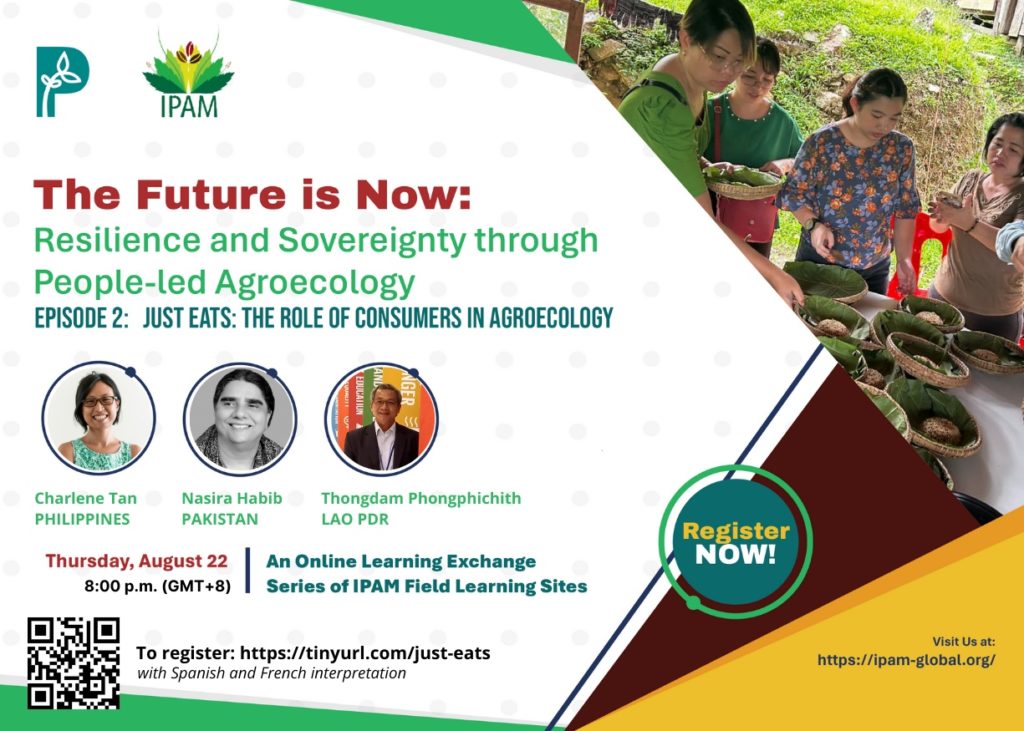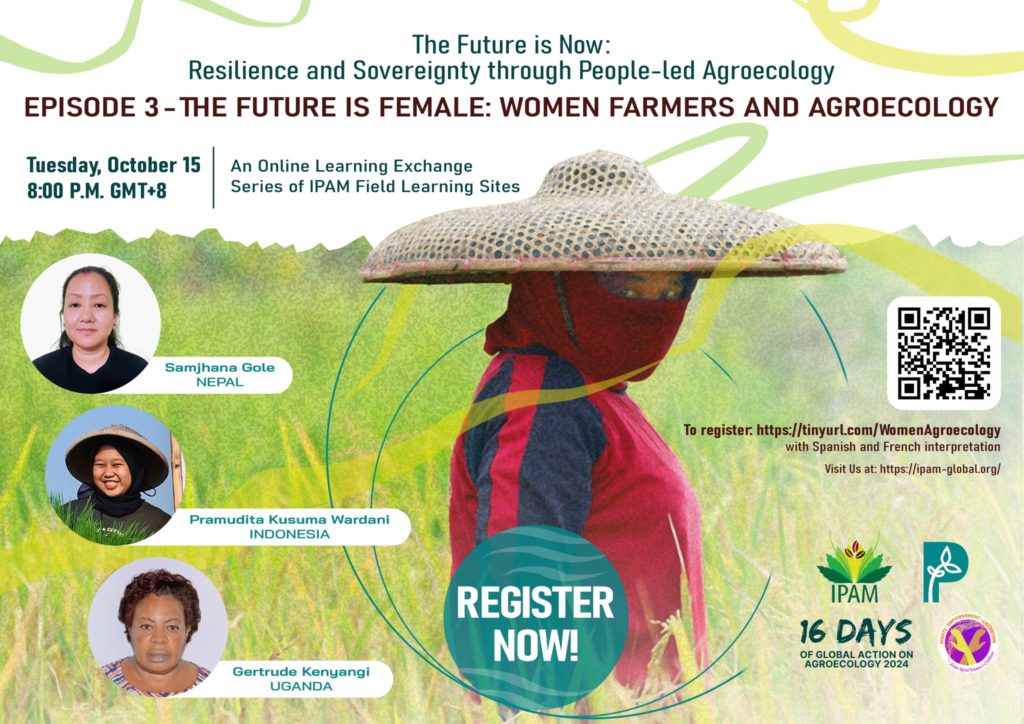An Online Learning Exchange Series of IPAM Field Learning Sites
July, August, and October 2024
- Concept
Our vision and understanding of the future of food and farming–in effect our hopes and aspirations for it–are being persistently undermined and hijacked.
A world where no one is poor and hungry, especially (it should go without saying) the people who grow our food, where everyone has equitable access to safe, healthy, sustainable food—this collective vision is being deliberately conflated by agro-TNCs with productivism that they say can be met only by wide-scale automation and standardization, opaque global corporate value chains dependent on fossil fuels, and expensive state-of-the-art, resource-intensive products that only they have the financial wherewithal to provide.
Theirs is a vision where the food system’s ability to survive and thrive does not rest on the protection of rights and interdependence of people and ecosystems, but on the relentless pursuit of profit through proprietary digital innovations to maintain dominance and competitive advantage. The current climate breakdown and widening inequality show how unsustainable this pathway is.
We believe that the future of our food system is agroecology. As a science, praxis, and rights-based movement, agroecology is able to embody the change we wish to see in our food system: plural, equitable, healthy, safe–where everyone is fed well while protecting our planet and communities.
In our vision of the future, people, rather than corporations, are the agents of transformation, and the change imagined and aspired towards is systemic rather than simplistic, distributive rather than accumulative, circular instead of destructive, and where the indigenous intersects with innovative rather than precludes it.
In the face of multiple crises and volatilities like the ongoing climate emergency, food insecurity, grinding poverty, deep inequality, and a rising global disease burden. It’s a world where food is a basic human right rather than a strategic asset to financialize and profit off of in global financial markets. It’s a food future that is biodiverse and resilient rather than one built on homogeneity and consolidation for control.
The future of food that we want is taking place now, not in some distant space-age laboratory alienated from the communities it purports to be in the service of.
Peasant farmers, civil society organizations, and people’s movements are already prefiguring our new food system by advancing agroecology and food sovereignty. This food future is already latent in our present work: generative like the seed because it is on the ground and in the hands of the people. The future of food is one that has long been in the making, growing from indigenous pathways, and constantly strengthened by an expanding praxis of diverse communities maintaining and protecting socially just alternative food and farming systems.
The International People’s Agroecology Movement (IPAM) is hosting an online learning exchange with its field learning sites from different parts of the world to highlight the multiple ways our agroecology farmers and people’s organizations are currently embodying the future we want to see in our food system.
- Objectives
Open to the public, this three-episode online series aims to:
-
- highlight the current practices of each FLS to grow the future of food from, against and beyond corporate imaginings of it, and from which other network members can learn,
- promote agroecology as a people-led innovation equipped to transform the global food system and address the multiple crises it faces, and
- deepen the engagement of FLSs to strengthen solidarity for movement building around agroecology as a pathway towards achieving food sovereignty.
- Episode 1 (July 18, 2024, Thursday, 8:00 – 10:00 p.m.): Indigenous, Innovative: Agroecology as a Climate Solution

The episode focuses on the importance of indigenous worldviews and practices in agroecology as a climate solution. We expose its dismissal by corporate actors, while extracting from it in the form of various false solutions stripped of their social and political power such as nature-based solutions, carbon offsetting, climate-smart agriculture, among others. With agroecology, farmers are active producers and not passive recipients of innovations for climate resilience. And under agroecology, innovation is not constrained merely within novel tools and technologies solely to improve productivity and profit. But innovation in essence means “doing things differently,” and therefore must be broadened to include social processes and structures of relationships, among others, to achieve climate resilience and food sovereignty, and protect the political and social agency of farmers and communities in meeting their needs and shaping their future.
- Episode 2 (August 22, 2024, Thursday): Just Eats: The Role of Consumers in Agroecology
As the alternative to conventional agriculture, much of what we know of agroecology has centered on the aspect of production, whether as a science, praxis, or movement, and rightly so given the violence and dispossession that has taken place and continues to do so with the rise of industrial agriculture. However, there remains very little discourse around the place of consumers in the agroecology framework, despite consumer demand for agroecological products having a significant role in its development and mainstreaming. At the same time, the corporatization of our food system has progressively diminished the role of consumers as simply actors at the receiving end of a linear value chain, their ability to effect changes tied solely to their purchasing power.
The episode highlights the consumers’ role in the creation of a just, healthy, equitable and sustainable food system. More and more people are recognizing this, evident in the growing demand for food that is ethically made and grown, and making sure this is widely accessible. But food system transformation requires civic participation beyond consumption. There is a shift that needs to happen from being consumers to co-producers, and it is essential to recognize and reclaim the attendant agency and power in this shift to be able to support the food systems transformation to agroecology.
We will hear from:
- Nasira Habib, Organica Pakistan/Khoj-Society for People’s Education, Pakistan
- Charlene Tan, Good Food Community, Philippines
- Thongdam Phongphichitch, Sustainable Agriculture and Environment Development Association, Lao PDR
August 22
8:00-10:00 pm (GMT+8)
5:00-7:00 pm Pakistan
5:45-7:45 pm Nepal
7:00-9:00 pm Laos
8:00-10:00 pm Philippines/Malaysia
Register here.
With Spanish and French interpretation
- Episode 3: (October 15, 2024, Tuesday): The Future is Female: Women Farmers and Agroecology
This episode focuses on women in agroecology, a science, praxis and movement that promotes gender equity and empowerment, given that women in agriculture continue to be among the most dispossessed and marginalized. Women make up more than half of the global number of farmers, but they are often considered subordinate to male farmers, their farm work often considered an extension to their house work, and therefore more likely to be denied access to resources and services that can improve their livelihood and promote their empowerment. Gender inequality also intensifies women farmers’ vulnerability to climate change. Women farmers are often the main promoters of climate-adaptation technologies in agriculture, however they “often feel ignored, overlooked and not taken seriously when they try to make their contributions and share their knowledge.” But it is women farmers who are at the frontlines of the transition from chemical-intensive corporatized agriculture to agroecology, given that the latter upholds their rights and supports their role in ensuring climate resiliency, food sufficiency, and nutrition security at home and in their communities through food sovereignty.










Discussion about this post